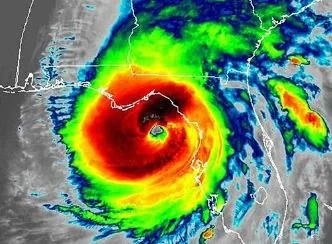Big Impacts
Over the years if I have learned one, big, important thing it’s that Mother Nature is large and definitely in charge. We puny little humans will be humbled at every opportunity. As the tragedy of Hurricane Helene unfolds I’m seeing lots of images of quaint little villages and artist communities wiped off the map, high in the mountains hundreds of miles from the coast no less. The rollercoaster at Six Flags Georgia looks like a great sea serpent with only the high parts of the track rising out of the muddy water.
But the only news about the agricultural impacts I’ve seen are on the Ag news only sites and channels. Right now in the south major harvests are just beginning. But with this storm system, farmers are poised to lose their pecans and cotton, two of the largest income producing crops in Georgia. While cotton farmers can call it wash and plant another crop for harvest next year, pecan trees can take as long as 25 years of growth to produce a crop.
Poultry houses have been flattened, pig barns flooded, entire herds of beef cows washed out of their pastures, and dairies left without power needed for milking the cows. Cows that cannot be milk develop painful health problems because you can’t just turn off their udders like water faucets. Even in areas not devastated by the hurricane, farmers are now struggling to get heavy equipment into fields for harvesting. There were peanuts to be dug and peaches to be picked, now all gone.
We’re nowhere near the damage zone, but the ongoing rains are definitely mucking up harvests. A few weeks ago my neighbor called to tell me he’d be harvesting hay as soon as the weather cooperated. He’s called twice to apologize, but each time I tell him there’s no apology needed. As farmers, we understand.
But too often consumers do not. They’ll blame the price of or the lack of on whoever sits in the Oval Office along with plenty of finger-pointing and name-calling. So for any of you, dear readers, who are prone to such behaviors, let this week’s Dishing the Dirt serve as a reminder that the price and availability of your food is entirely dependent on what Mother Nature dishes out as well as supply & demand.
Farmers who grow their own feedstocks have a buffer against weather conditions and market fluctuations, but anyone having to purchase feeds will now be competing with farmers who have lost access to feed sources destroyed by Hurricane Helene and every other weather-related disaster in an agricultural production zone. This means anyone raising omnivores such as pigs and poultry are going to see their feed prices rise. And for farmers who must purchase their hay and straw, they will now also be competing with those farmers who can’t procure theirs locally due to storm damages. I’ve been watching this happen in real-time as local farmers who once sold their baled forages and bedding at local auctions to local farmers week by week now command premium prices by loading their harvests on to tractor trailers parked in the fields ready to whisk it thousands of miles away.
Farms are businesses and just like every other business in America, when our costs rise so does the prices of our products. It’s either that or go out of business. Hurricanes, floods, fires and droughts cause huge disruptions in our food chain, rippling availability far-reaching beyond what most consumers imagine.
And I haven’t even mentioned food security, but I think by now you get my point.

